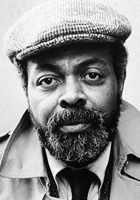Short Speech to My Friends Poem by Amiri Baraka
Short Speech to My Friends
A political art, let it be
tenderness, low strings the fingers
touch, or the width of autumn
climbing wider avenues, among the virtue
and dignity of knowing what city
you're in, who to talk to, what clothes
—even what buttons—to wear. I address
/ the society
the image, of
common utopia.
/ The perversity
of separation, isolation,
after so many years of trying to enter their kingdoms,
now they suffer in tears, these others, saxophones whining
through the wooden doors of their less than gracious homes.
The poor have become our creators. The black. The thoroughly
ignorant.
Let the combination of morality
and inhumanity
begin.
2.
Is power, the enemy? (Destroyer
of dawns, cool flesh of valentines, among
the radios, pauses, drunks
of the 19th century. I see it,
as any man's single history. All the possible heroes
dead from heat exhaustion
at the beach
or hiding for years from cameras
only to die cheaply in the pages
of our daily lie.
One hero
has pretensions toward literature
one toward the cultivation of errors, arrogance,
and constantly changing disguises, as trucker, boxer,
valet, barkeep, in the aging taverns of memory. Making love
to those speedy heroines of masturbation or kicking literal evil
continually down filmy public stairs.
A compromise
would be silence. To shut up, even such risk
as the proper placement
of verbs and nouns. To freeze the spit
in mid-air, as it aims itself
at some valiant intellectual's face.
There would be someone
who would understand, for whatever
fancy reason. Dead, lying, Roi, as your children
cane up, would also rise. As George Armstrong Custer
these 100 years, has never made
a mistake.
This poem has not been translated into any other language yet.
I would like to translate this poem